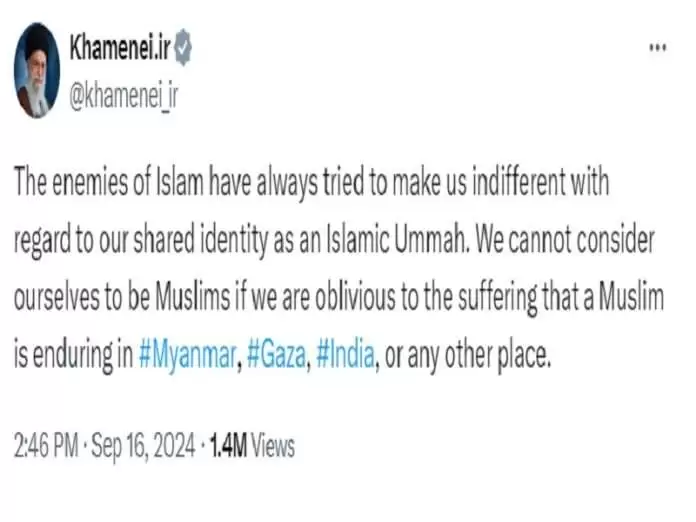Ayatollah Khamenei tweeted on Monday that “The enemies of Islam have always tried to make us indifferent with regard to our shared identity as an Islamic Ummah. We cannot consider ourselves to be Muslims if we are oblivious to the suffering that a Muslim is enduring in #Myanmar, #Gaza, #India, or any other place.” This prompted a sharp rebuke from the Indian Ministry of External Affairs, which described it as “unacceptable” and “advised” him “to look at [his country’s] own record” in treating minorities.
Regardless of whatever anyone’s opinion is about the state of minorities in either country, the fact of the matter is that the Supreme Leader’s remark is part of a pattern with huge implications. It follows his tweet in late July about the Zangezur Corridor, which was analyzed here and then followed up on here after Iran summoned the Russian Ambassador earlier this month to explain their concerns about Moscow’s support of this project.
What’s known as the Zangezur Corridor was agreed to between Russia, Armenia, and Azerbaijan in the last clause of the Moscow-mediated November 2020 ceasefire, however, while the treatment of minorities is the responsibility of the state within which they reside, in this case, India. While all countries have the right to share their views about whatever it may be, Iran’s decision to express such critical ones on sensitive issues involving two of its top strategic partners is surprising.
None of this is new though: Iran’s opposition to the Zangezur Corridor is already known, while the Supreme Leader has occasionally commented on Indian Muslims in the past. The first concerns a project along its northern border while the second involves the situation with fellow believers to whom Iran considers itself to have a moral responsibility to support. Nevertheless, the timing of the Supreme Leader’s two remarks and the language that he used suggest that something more might be going on.
New Iranian President Masoud Pezeshkian published a refreshing foreign policy vision in mid-July shortly before his inauguration in which he promised that “we will welcome sincere efforts to alleviate tensions and will reciprocate good-faith with good-faith.” Regrettably, that’s not what the Supreme Leader ultimately decided to do with regards to the Zangezur Corridor and the alleged situation with Indian Muslims, instead preferring to openly criticize both despite Russia and India’s direct stakes in each.
Once again, it’s his right to share his views about whatever it may be, but openly politicizing both issues instead of continuing to address them behind closed doors per standard diplomatic protocol and commenting on them sequentially in just the span of six weeks caught many observers off guard. Russia and India occupy important positions in Iranian grand strategy, especially since they’re anchor states along the North-South Transport Corridor (NSTC), so ruffling their feathers at the same time is strange.
Some had earlier speculated that Pezeshkian would try to improve ties with the West due to his reputation as a “moderate”/“reformist”, though the counterargument was that his faction’s “hardline”/“principalist” “friendly rivals” could impede progress on this. Whether by accident or design, however, the “principalists’” politicization of issues that are so sensitive to Russia and India could make the West and especially its American leader more interested in resuming dialogue with Iran.
After all, from the West’s perspective, Iran suddenly created complications in those two strategic partnerships that are integral for the success of the NSTC and right before the BRICS Summit at that. Few could have predicted that Iran would do this considering the centrality of this corridor to its geo-economic plans, but that’s exactly what just happened. The only cogent explanation is that Iran decided without notice or prior signals to prioritize unstated goals at the possible expense of this one.
Keeping in mind that Pezeshkian just announced during his first press conference that Iran will strive to resolve its issues with the FATF and JCPOA, both of which require American agreement, it therefore follows that the preceding political provocations might be seen as a means towards that end. To be absolutely clear, Iran isn’t plotting to “betray” Russia, India, other BRICS countries, and the multipolar cause in general, so readers shouldn’t fall for sensationalist predictions about what these trends signify.
They should also beware of the strawmen that some of Iran’s most passionate supporters in the Alt-Media Community (AMC) might construct for discrediting the insight shared in this analysis about Iran’s unforeseen diplomatic interventions in these two sensitive issues and the possible motives behind them. The Mainstream Media has an interest in dividing-and-ruling these three countries while many in the AMC have an interest in downplaying disputes between them, thus making both equally unreliable.
The objectively existing and easily verifiable facts are as follows: 1) Pezeshkian’s “reformists” want to resume dialogue with the West; 2) the Supreme Leader, who’s the ultimate “principalist” figure, unexpectedly politicized issues that are very sensitive for Iran’s Russian and Indian strategic partners; 3) all three cooperate on the NSTC; 4) which is beyond the US’ influence; 5) and any newfound mistrust between them could therefore slow down NSTC-driven multipolar integration in this part of Eurasia.
The best-case scenario is that the Supreme Leader doesn’t comment on the Zangezur Corridor or the alleged situation with Indian Muslims anymore, all the while their diplomats work on addressing these issues behind closed doors per standard diplomatic protocol. Even if the outcome of these talks isn’t what Iran would prefer, it would do well to keep their shared geo-economic goals in mind instead of prioritizing unstated goals at their possible expense, or at least come clean with what else it’s pursuing.







